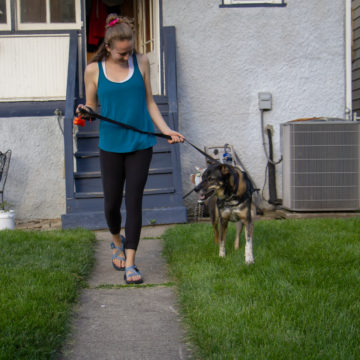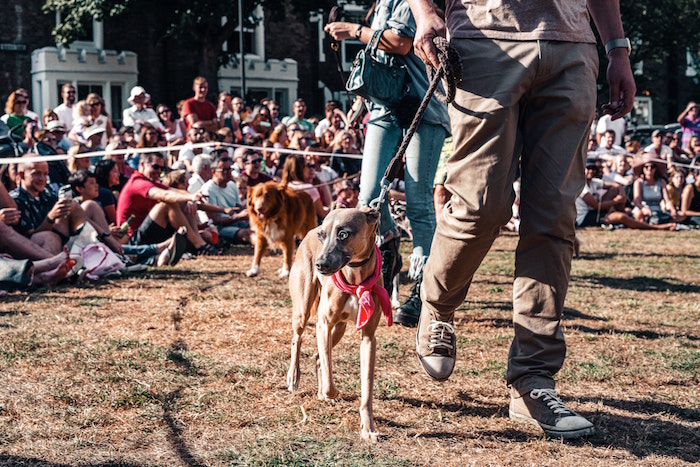Since COVID-19 began to turn normal life upside-down, way back in spring of 2020 (which honestly feels a lifetime ago—anyone else feeling that?), there have been stories all over the news about the skyrocketing increase in people taking on companion animals. This boom in humans’ desire for the company of a non-human companion during lockdown even led to a national “shortage” of dogs in the U.K., with waiting lists for dogs increased to four times their normal length!

As an animal lover and passionate ethical vegan, I can say for sure that it’s very easy to see why people would want to spend time in the company of non-human beings. I have certainly found that since going vegan, and being attuned to Reiki, my connection with animals has moved to a whole new level, which is tremendously rewarding, and an incredible learning/healing experience for me! Whenever I spend time with an animal, be it borrowing a dog, or at my local shelter, I come away from the experience feeling lighter, such a lot of love, and it’s like a gap I didn’t even know was there, is filled.
The impact of COVID-19 on mental health
Vast stretches of lockdown and distancing measures are leading to an increase in people experiencing desperate isolation, even amounting to an international mental health crisis. And according to a survey run across 7 countries by the International Committee of the Red Cross, around half the people who responded said that their mental health had been negatively impacted by COVID-19. So it’s understandable that people would want to reach out to the safety (emotionally and arguably, medically) of non-human companionship. Especially as spending time with animals has been shown to have emotional and physiological stress reduction benefits to humans.

Widespread recognition of animals’ importance
So on the surface it would appear that this might be an amazing opportunity for progressing animal rights, with humans realizing how much they have needed face-to-face social interaction, and having that need met by companion animals. Surely many people will have spent lockdown discovering how amazing, unique and characterful members of other species actually are. In fact, COVID-19 might have yet another awesome and important silver lining, in the form of a really positive step towards non-human animals’ lives being viewed as being as important as those of humans, culturally if not legally.
But have the rising “demand” for animals and the perception of the positive aspects they bring, truly adjusted people’s attitudes towards non-humans? Do people really respect and value their companions’ feelings, wishes and emotions as much as they would another human’s?
A study carried out by the Universities of York and Lincoln, interviewed 6,000 participants with at least one companion animal. The results showed that 90% of participants felt that their animal had helped their well-being and emotional state during lockdown, and 96% said that their having a companion animal had helped motivate them to exercise and stay fit. However, tellingly, only 68% said that they had felt concern over the impacts of lockdown on their animal family member’s—including reduced access to veterinary care, restrictions on exercise, and day-to-day care. These figures indicate that while many people recognize and value the personal benefits of having an animal in their lives, less people seem to care as much about reciprocating the love and care they receive from their companions. Sadly, this disparity strongly implies that many people who see themselves as feeling “love” for, and valuing their animals, still have an attitude of ownership and entitlement over them.
It could be argued that having the perspective of an animal being the “property” of the human “owner” isn’t ideal, but that at least the animals are benefitting from having a loving, secure home with someone who understands and meets their physical needs and cares about their well-being—even if it is from a more self-serving place than that of their non-human companion. But even if the love they have for the family members they call “pets” (I’m not a fan of that term) isn’t as unconditional as the love they receive in return, could there be something to be said for giving so many shelter animals a home rather than their being out on the streets? Well, if there’s no alternative and the animals are dependent on having a human companion to survive and thrive, then I would personally find it difficult to argue with allowing a degree of speciesism in the human adopters as a necessary evil. Provided the animal’s well-being is prioritized, and their physical and emotional needs are met, then backwards mindsets maybe shouldn’t be a deal-breaker.
How COVID is negatively impacting animal welfare
But sadly, there is a darker side to the COVID-inspired appetite for companion animals. The increase in demand for dogs has also been partly filled by animal breeders, whose methods are often cruel and exploitative. According to PETA, “The dog-breeding industry includes puppy mills—hellish mass-breeding facilities in which dogs are treated like puppy-producing machines and never given any love or attention or even the opportunity to stretch their legs.” And when their bodies are worn out and no longer able to reproduce, the female dogs are often killed.
“Operation Delphin” (part of a multi-agency task-force in Scotland, whose purpose is tackling the “low welfare puppy trade”) saw a Police Scotland raid of two properties on November 27. A police spokesperson highlighted the horrific scale of this practice as involving “thousands” of puppies each year, and that they are “often removed from their mothers too early—causing distress, harm and health problems.” In the U.K., third-party selling of companion animal has recently been made illegal, so in fact anyone other than a breeder who sells a “pet” is literally committing an actual crime, as well as an ethical one.
And in September, over 5,000 rabbits, cats, dogs, and other animals were discovered dead inside cardboard boxes with holes at a logistics center in China. They had been stranded for a week without food or water, and yet another shipment to a nearby village was discovered with 1,000 additional dead animals destined to become pets.
And then there’s “petfishing”: where unscrupulous criminals who run illegal rackets, posing as legitimate animal breeders (often temporarily renting a home to make their backstory more plausible) and selling (often imported) ill or very young animals, for a high price and lying about the animal’s background. The U.K. Government, alongside the RSPCA and many celebrities, are running a campaign warning of the danger signs, for those looking for companion animals.
How to help companion animals
So in a non-vegan world, with human to non-human behaviors ranging from ownership/entitlement, right through to unspeakable cruelty and exploitation, what can one individual do to help, particularly if their lease/home size doesn’t allow for adoption of a rescue animal?
Well, aside from going vegan, and looking into animal activism, fostering is a good option, and a really selfless way to support the recovery and rehousing of a rescue animal. But if fostering an animal isn’t for you, animal shelters are crying out for volunteers in a number of roles, often including admin and gardening. Or you could do some fundraising to help them, if that’s more your thing! So if you have an animal allergy or phobia, that doesn’t have to stop you from supporting your local shelter!
The need for volunteers is sadly likely to increase massively in the short term, with both the annual trend of people unprepared for the responsibility of caring for a companion animal, giving up their new companions around Christmas, and this year, animal charities are predicting another increase in demand on local shelters, when people stop working from home as much.
Volunteering is flexible, greatly appreciated by the animals (who show it with cuddles, licks, and adoring gazes) as well as the people who run the centers. I’ve been volunteering with my local shelter this year, firstly as a foster parent, and more recently volunteering a few hours twice a week, giving Reiki to the animals. For me, what I get back in the way of love and warm fuzzies is worth way more than the few hours I give up! It costs nothing financially, and I’ve formed some lovely bonds with the sweet souls who live at the center! Helping them learn to trust humans again, seeing their healing journeys, and the change from stress and/or past trauma to more relaxed and confident, is the most rewarding and beautiful experience.
Also by Ema: Why & How To Pick Vegan Drinks, From Biodynamic Wines To Hand-Filtered Champagnes
Get more like this—Sign up for our daily inspirational newsletter for exclusive content!
__
Photo: Kitty Louise; Maille O’Donnell; Sebastian Coman Travel via Unsplash





